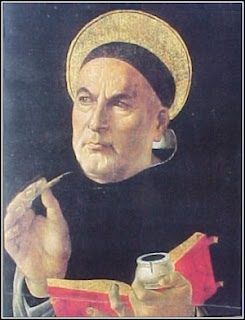Thomas Aquinas, Philosopher and Theology Leading experts from Italy
Thomas Aquinas (1225, Aquino, Italy - Fossanova, Italy, March 7, 1274), sometimes also called Thomas Aquinas (Italian: Tommaso d'Aquino) was a renowned philosopher and theologian from Italy. He became famous mainly because it can make a synthesis of Aristotelian philosophy and teachings of the Christian Church. This synthesis is contained in the main works: Summa Theologiae (1273). He is referred to as "major Christian theologian." In fact it was regarded as a saint by the Catholic Church and has a saint.
The life of Thomas Aquinas
Aquinas is the greatest scholastic theologian. He was a pupil of Albertus Magnus. Albertus Aristotle taught him that he was very proficient in that philosophy. Aristotle's philosophical views diselaraskannya with biblical views. Is a very successful align them so that the philosophy of Aristotle was not a dangerous element for the Christian faith. In 1879, the teachings are used as a legal doctrine in the Roman Catholic Church by Pope Leo XIII.
Thomas was born in Roccasecca, near Aquino, Italy, in 1225. His father was Prince Landulf of Aquino. His parents were devout Catholics. That is why his son, Thomas, at the age of five years handed over to the monastery at Monte Cassino Benedict to be fostered so that later became a monk. After ten years Thomas was in Monte Cassino, he moved to Naples to complete the language of education. While there, he became interested in the work of the apostolic church, and he tried to move to the Dominicans, an order that very role in the century. His desire is not sanctioned by her parents so she should stay in Roccasecca over a year old. However, the determination was made that the parents give in to her desires. In 1245, Thomas officially became a member of the Dominican order.
As a member of the Dominicans, Thomas sent to study at the University of Paris, a very reputable university in those days. He studied there for three years (1245-1248). This is where she met Albertus Magnus who introduced Aristotle to him. He accompanied Albertus Magnus gave a lecture at the Studium Generale in Cologne, France, in the year 1248 to 1252.
In 1252, he returned to Paris and began to give lectures Biblical (1252-1254) and the Sentences, written by Peter Abelard (1254-1256) in the conventional St. Jacques, Paris.
Thomas is well-known prowess that he was assigned to give lectures in philosophy and theology in several cities in Italy, as in Anagni, Orvieto, Rome, and Viterbo, for ten years. In 1269, Thomas was recalled to Paris. He was only three years of being there because in 1272 he was commissioned to open a Dominican school in Naples.
On the way to the Council of Lyons, Thomas suddenly ill and died in the convent Fossanuova, March 7, 1274. Pope John XXII raised Thomas as saints in 1323.
The teachings of Thomas Aquinas
Thomas teaches God as "there is an infinite" (ipsum Esse subsistence). God is the "Essence of the highest", the highest state memunyai. God is the driver who did not move. Appear once the influence of Aristotle in his view.
World and human life is divided into two levels, namely the supernatural and natural, upper and lower levels. Lower level (natural) can only be understood with your intellect. Natural life is not perfect and it could be perfect if perfected by the life of grace (supernatural). "Nature of nature is not abolished, but perfected by grace," said Thomas Aquinas.
About humans, Thomas teaches that in the beginning of human life memunyai perfect natural and given the grace of God. When man fell into sin, God's grace (supernatural grace) is gone and the nature of human nature to be less than perfect. Humans can no longer fulfill the law of love without the help of supernatural grace. Supernatural grace is offered to man through the church. With the help of supernatural grace to do it man strengthened his safety and allow humans won by Christ.
About the sacrament, he argues that there are seven sacraments commanded by Christ, and most important is the Eucharist sacrament (sacramentum sacramentorum). Supernatural grace is channeled to the believer through the sacraments. By receiving the sacraments, people began to walk toward a new life and do good deeds that make it acceptable to God. Thus, the grace of the supernatural is very important because humans can not do anything good without the grace given by God.
The Church sees as the safety agency that can do no wrong in his teachings. The Pope has the supreme authority in the church and Pauslah the only teacher of the highest in the church. Theological works of Thomas is most famous is the "Summa Contra Gentiles" and "Summa Theologia".











